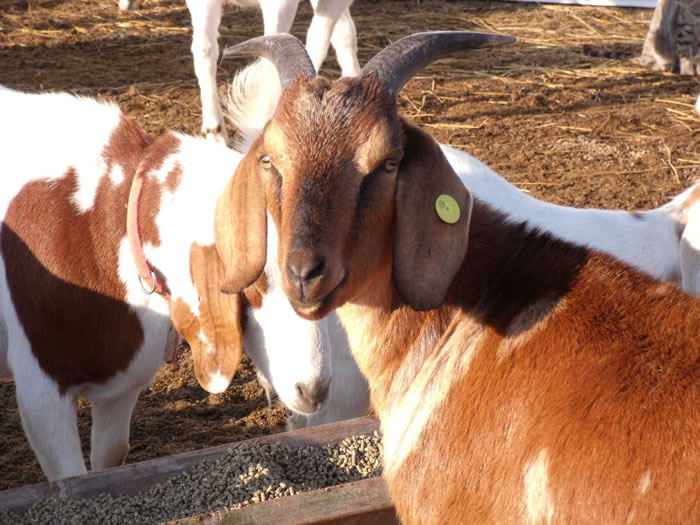Goats

Goat has recently evolved as a livestock commodity in Canada and is still in its infancy. With the increase in ethnic population across the country, the demand for goat meat has increased. The goat industry produces range of products including: red meat, milk, fibre and skin. Red meat produced by goats is considered very lean with minimal marbling and goat milk is also used as an alternative to cow's milk. Goat milk and the cheeses made from it are one of the most consumed dairy products in the world. Goat fibre (Mohair) and the skin are also used in several products. Goat fibre being shiny and lustrous is used in the manufacturing of fine textile products ex: carpets, gloves, sweaters, socks and other home furnishings.
There are several livestock producers raising meat goats in Manitoba. Manitoba also has one licensed goat dairy supplying fluid milk and cheese to many retailers in Western Canada. Due to the increase in local ethnic population, the majority of the goat meat produced in Manitoba is consumed locally. Some live goats are also marketed to supply the demand for goat meat in Eastern and Western Canada. Raising goats is similar to raising other extensively reared livestock such as beef and sheep.
You will find information about raising goats including:
- Breeding and Reproduction
- Feeds and Nutrition
- Management
- Facilities
- Animal Health and Biosecurity
- On-Farm Food Safety
- Research
- Other Links
Find other information on Financial Assistance, Wildlife Damage Compensation, Manure and Mortalities Management.
Breeding and Reproduction
An efficiently managed breeding program of a goat operation must focus on the breed characters to meet the goals of the operation. Breeding and reproduction plans always start from the market end of the operation. That is why it is important to understand the market where the goat products (genetics, meat, fibre and milk) will eventually end up .
Feeds and Nutrition
Manitoba goat producers have year round access to a variety of reasonably priced, locally grown forages and feed grains (barley, wheat, oats, corn, etc.) to meet the nutritional needs of their herds. This access to feedstuffs is important because feeding is one of the major expenses on a goat operation. The following information will help to provide nutritionally balanced and cost efficient feeds for goat herds.
- Goats and Their Nutrition
- Feeding The Doe Herd
- Types of Feed for Goats
- Choosing a Mineral for a Goat Herd
Management
Proper management is important to the sustainability and profitability of goat production. Each goat farm is managed differently specific to the goals of the operation. To maximize the profits of a goat operation timely management of breeding, kidding, health and feeding is the key. Following information provide the tools to manage different phases of production.
- Kidding Management
- Goat Welfare Management
- Goat Market and Marketing
- Ethnic Holiday Calendar for Goat Markets (updated calendar coming soon)
Facilities
Many goat breeds are very adaptable to Manitoba's climate. For a goat-kid operation, the facility housing requirements depend on the kidding time of the goat herd. For winter kidding insulated facilities are necessary. For kidding during spring or early summer, simple barns or shelters providing protection from wildlife may be sufficient. Open front sheds, shelterbelts or windbreak fences are used for confined operations. Adult goats normally do not require insulated or heated housing except during extreme weather conditions. The National Farm Animal Care Council provides the guidelines to address the welfare of the goats throughout production.
An ideal building site is the one that slopes to the south and has shelter from the prevailing winter winds. The wintering and feedlot areas being "confined livestock areas" must be sited according to the Livestock Manure and Mortalities Management Regulation.
- Code of Practice - Goats (National Farm Animal Care Council)
Health and Biosecurity
For sustainable growth of a goat operation regular monitoring of flock health for parasites, body condition scoring, biosecurity and proper vaccination is needed. Links below provide the resources for important health related topics.
On-Farm Food Safety
The goat on-farm food safety program is a nationally recognized program developed by Canadian National Goat Federation. The OFFS program examines and outlines good production practices (GPP) designed to minimize food safety risks and to produce safe and high quality products. Please visit the following link for more information about the goat OFFS program.
- On-Farm Food Safety Program - Goat (Canadian National Goat Federation)

